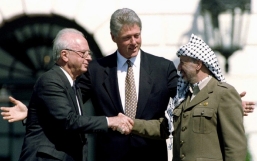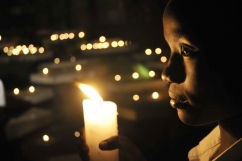All of a sudden, lots of people who don't usually pay any attention to politics in Northern Ireland seem to be experts. Opinions have flown around social media about the deal made between Theresa May and the Democratic Unionist Party.
Because of the DUP's roots in the conservative evangelical Presbyterian community of Northern Ireland, and owing to their socially conservative stance on abortion and gay marriage, the spotlight has been on the wisdom of May's deal.
When the negotiations came to an end and an agreement was reached, it became clear that the price of doing business was around a billon pounds – extra funding was promised to public infrastructure Northern Ireland.
There were two obvious general responses to this. First, it was surprising that Theresa May had now found the 'magic money tree' she claimed didn't exist, in order to save her own skin. Secondly, deprived communities in the rest of the UK were apt to wonder why they must march on under austerity, while investment was suddenly appropriate for Northern Ireland.
The deal looked pretty craven, and no amount of counter claims from government ministers could hide the essence of what had happened. The DUP had negotiated well and secured a billion pounds worth of 'pork barrel' as our American cousins refer to it, for their back yard. The support of the DUP had basically been bought by the Prime Minister.
What's more interesting and, indeed, worrying is what this may mean for the peace process.
Growing up in the 80s, terrorist activity in Northern Ireland (and the rest of the UK) was rarely away from the news. Yet, thanks to painstaking negotiations from John Major, Mo Molam and others, a peace deal was eventually reached. The animosity between the communities which goes back centuries and which had flared into an especially brutal period of violence 30 years earlier had come to an end.
It wasn't a panacea – the divide between Nationalist and Loyalist still existed and in many places Catholics and Protestants lived separate lives. The model of government that mandated power-sharing between the two sides was seen by some as a stitch-up and the recent breakdown showed its limitations.
However, the fact that peace has held firm in the almost two decades since the Good Friday Agreement was signed, is one of the great political achievements of my lifetime. Former enemies in government together is a rare sight anywhere in the world.
When I spent some time in Jerusalem a few years ago I met many Palestinians and also some Israelis who despaired of their situation. They longed for peace and justice in the Holy Land but saw little prospect.
I lost count of the amount of times that I urged them to study the history of Northern Ireland and to look closely at what could be achieved.
Israel-Palestine is not Northern Ireland and there are other factors at play. But the two are old religious/tribal conflicts that gained new energy in the 20<sup>th Century. The fact that a solution was found in Northern Ireland, even though it was not perfect, gave me hope, that even though the prospects look bleak right now, a deal is possible in Israel-Palestine (and anywhere else there is conflict).
Now, though? The future in Northern Ireland looks uncertain.
The British Government has to be an honest broker in Northern Ireland. It has to command the full confidence of both communities. It has to maintain impartiality and be trusted implicitly by Unionists and Republicans.
Although the confidence and supply arrangement between the Conservatives and the DUP doesn't necessarily mean a complete breakdown of that trust, it is now a serious risk. The DUP may have won public service investment that will be enjoyed by all communities in Northern Ireland. But will Nationalists (who have felt the rough end of British treatment for hundreds of years) remain confident that Westminster is playing a fair and impartial game?
We can only hope. We are in uncharted waters. Although in theory, the deal makes sense, there is no knowing what circumstances will throw up in the coming months and years which could put huge strain on the deal and on public confidence in the institutions which are essential to the power-sharing agreement.
This is a precarious time for the whole of the UK, with an uncertain economic outlook, constitutional change and unstable politics. What Northern Ireland needs and deserves isn't just pork from Westminster. It needs mature, sensible and peaceful politics from leaders near and far. Let's hope and pray that's what the next few years brings...
Follow Andy Walton on Twitter @waltonandy
















